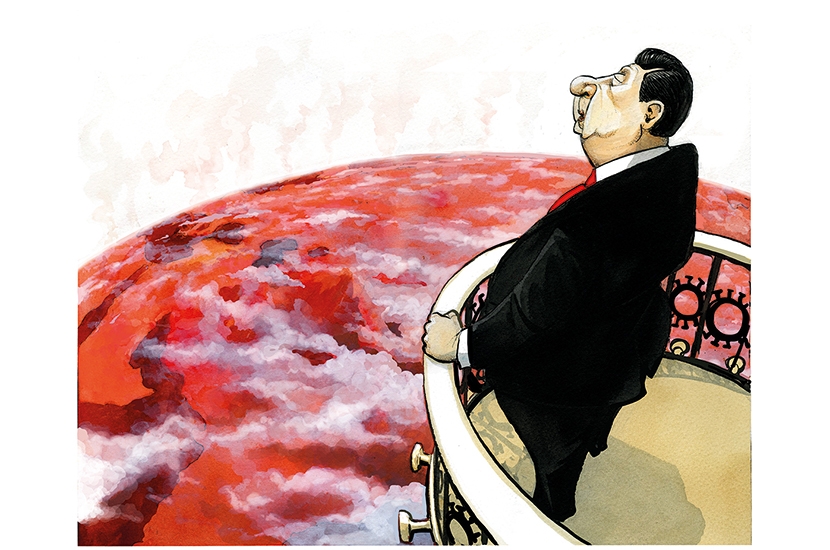The most significant and lasting change brought about by COVID is that it has woken the West up to the threat posed by Communist China. The fact that the initial severity of the outbreak was covered up by Chinese Communist party authorities did not surprise western governments. It was Beijing’s ‘wolf-warrior diplomacy’ as the virus raged round the globe that made them grasp the true nature of President Xi’s China.
In March, the UK government was taken aback by the extreme misinformation promoted by the CCP to try to suggest that the US military was somehow to blame for the emergence of the virus. The shortages of personal protective equipment reminded western governments how reliant they had become on Chinese manufacturing and also highlighted the difference between dealing with China and dealing with companies in democratic countries: ministers hesitated to criticize the CCP for fear that the next plane loaded with PPE wouldn’t take off. This was a valid concern. When Australia suggested that there should be an independent inquiry into the origins of the virus, Beijing aggressively slapped tariffs on its goods. The CCP’s behavior shows that if you develop a close economic relationship with China, it will be used to ‘bully you politically’, as one well-placed British government source puts it.
All this has led to a shift in UK government policy. At the start of the 2010s, David Cameron and George Osborne wanted the UK to be China’s best friend in the West. Their approach was inherited by Theresa May and, at first, Boris Johnson. At the start of this year, the country was still on track to have Huawei, a Chinese firm with close links to the People’s Liberation Army, play a key role in the building of its 5G mobile phone network. This policy is now changing, thanks to pressure from both the United States and Tory backbenchers. From September next year, Huawei kit cannot be installed in the 5G network, and any that’s already there must be removed by 2027.
A new national security and investment bill, now going through parliament, is designed to stop Chinese firms from buying up British companies — and their intellectual property — in strategically important fields. This legislation is long overdue, given how vital technology will be to the coming rivalry between China and the West. To allow Chinese firms, which are not independent of the state, to purchase technology start-ups is extremely shortsighted. There is a strong case for far stricter rules regarding universities’ research deals with Chinese companies. Yes, these firms provide funds. But given how much of the 21st century will be a battle for technological supremacy, who really benefits from Huawei’s partnerships with various British universities?
If 2020 was the year that the West woke up to the threat of Xi’s China, the question for 2021 becomes: how will it respond?
During his presidency, Donald Trump reversed the Obama administration’s overly passive approach to China’s rise. But Trump was ill-suited to galvanizing the West to respond to this threat. First, his fondness for autocrats made him wholly unfit for the role of moral leader in this struggle. Second, pushing back on China requires the building of alliances and working through multi-lateral institutions — which Trump was atrocious at. He withdrew the US from the Trans-Pacific Partnership, which was meant to act as an economic counter to China, and his decision to pull America out of the World Health Organization only increased China’s influence within it.
Joe Biden’s incoming administration in many ways represents a return to the Obama era, but US relations with China will be an important exception; Biden will take a much more hardline approach. There is now a bipartisan consensus in the States that China is a strategic threat. In fact, in his recent memoir Obama suggests that he would have taken a stricter approach if he hadn’t also had to deal with the aftermath of the 2008 financial crisis.
As the host of next year’s G7, the UK has an important role to play in this western pushback and intends to use the meeting to launch the D10, an alliance of democracies designed to counter China. Australia, South Korea and India — all countries vital to any strategy to contain China — will be invited. The Johnson government believes it has a particularly important role to play in bringing India into this alliance, given that relations between Modi and Biden will not be easy.
In Whitehall there is also interest in the idea of a T12: a grouping of democracies with a particular interest in technology. Any attempt to contain China must produce an alternative to its technological solutions. But the West is hampered by the split between the US and the EU over data and privacy rules. This divide has led to two quite separate tech ecosystems and held back the effort to respond to China. The West must overcome these internal divisions if it is to prevent Beijing from taking a decisive lead in the industries of the future. This is just as important as coordinating investment in 6G technology to prevent a repeat of the current situation, in which Huawei offers a dramatically cheaper solution than any company from a democratic state.
[special_offer]
China’s technological edge is one of the reasons it is in so many ways a more formidable competitor than the Soviet Union was. Another is its position in the world economy. It is no coincidence that no leading Hollywood studio has made a movie critical of China since Seven Years in Tibet in 1997. The five-year ban that Beijing imposed on Columbia Tristar led America’s moviemakers to conclude that it was best to hold their tongues when it came to China.
China’s integration into the global economy also means that there are many in the business world who don’t want anything to change. One influential Tory who has been pushing for a tougher line on Beijing laments that: ‘You didn’t have UK corporates calling you up to express disappointment if you criticized the Soviet Union.’
2020 has been an awful year for the West. Nearly every western country has handled the pandemic badly. The IMF estimates that China will be the only major economy to grow in 2020. But the rapid development of vaccines should restore some of the democratic world’s intellectual self-confidence. It will need that in the coming generational struggle with Xi’s China.
This article was originally published in The Spectator’s UK magazine. Subscribe to the US edition here.





















